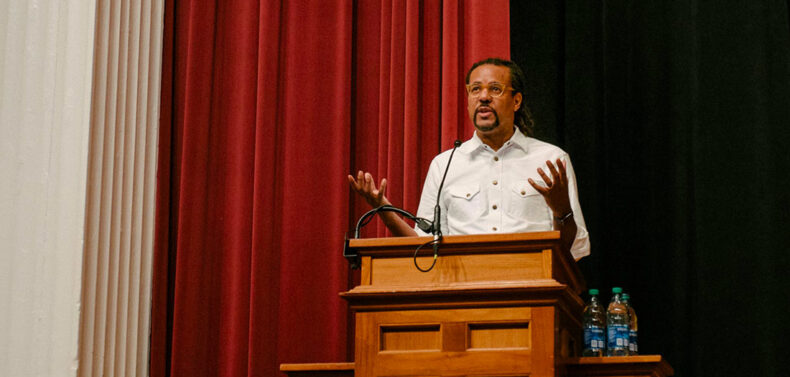Novelist Colson Whitehead spoke to students at the University of Georgia and other community members last week about censorship, the writing process and how to support yourself as an artist.
The Chapel held a full house for Whitehead’s lecture on Nov. 16, with a predominantly middle-aged audience. Laughter filled the entire hour and a half as Whitehead showcased his whimsical personality through his stories.
Being a writer for almost three decades now, he shared the inspiration behind some of his most iconic characters, his anxiety of conveying the right messages and tidbits of his own creative process. As a lifetime enthusiast of everything sci-fi, he admitted that at one point he wanted to write “the Black Shining” and “the Black Salem’s Lot” —referencing two Stephen King novels—before stumbling upon high realism and modernist works. Nine publications later, it’s safe to say he has found his niche.
Following a Q&A, the session ended with Whitehead asking the crowd, with a count of hands, which theme he should use for his next book—the Russian Revolution or Star Wars?
The author’s visit to Athens didn’t end there. At 9 a.m. the next day, Whitehead met with a group of about 20 students and faculty at UGA’s Willson Center for Humanities and Arts. These students belong to the school’s African American studies program, creative writing club, and art and history departments. Many are in their graduate years, with some already in the workforce. Nevertheless, they all share a bond for creative writing, be it poetry, short stories or nonfiction.
When asked about his writing routine, Whitehead said that he emphasizes outlining and setting small goals. For him, “eight pages a week is a good accumulation.” He recalled his experiences as a journalist for the Village Voice alternative newspaper in New York City before it was shut down. There, he learned to collaborate with editors and take responsibility for his own work schedule, a lesson that applies to this day.
One student from the college of education asked the writer if he has ever experienced censorship of his own work. While none of his books have been banned, Whitehead acknowledged that literary censorship is an ongoing issue. “There’s always these moments where we’re vacillated between conservatism and racism. And we’re definitely at a time now when there’s a reaction under force,” he said. “But for me, I see that people are just sort of terrible, and they do terrible things.”
Another student inquired about finding balance between making art and financially supporting oneself, to which the author stressed the importance of gig work. “No matter what level you’re at, you’re balancing the time and money equation, and if you don’t figure it out, you’re not getting your art done,” Whitehead said.
After the morning session, Whitehead made an appearance at Cedar Shoals High School to speak to aspiring writers there as well.
Whitehead’s lecture and visitations were a part of UGA’s signature lecture series—which features “speakers noted nationally or internationally for their broad, multidisciplinary appeal and compelling bodies of work”—and the Phinizy lecture series. Endowed by the late professor Ferdinand Phinizy Calhoun as a memorial to his grandfather, this lectureship has attracted distinguished writers and thought leaders from all around the country, such as economist John Kenneth Galbraith and novelist Walker Percy.
It was also a part of UGA’s 12th Spotlight on the Arts Festival, an annual celebration of literary, visual and performing arts on campus, held every November. Besides lecture and panel events, the festival highlights new exhibitions, pop-up markets, concerts, art workshops and film screenings. A full schedule can be found on the UGA art council website at arts.uga.edu.
Whitehead, 54, debuted in 1999 with The Intuitionist, which critics compared to classics like Ralph Ellison’s The Invisible Man, Toni Morrison’s The Bluest Eye and Joseph Heller’s Catch-22. He won a Pulitzer and the National Book Award for The Underground Railroad, an alternative history novel that depicts the network for helping enslaved people escape the South as a literal subway system. His latest, Crook Manifesto, is a sequel to the crime novel Harlem Shuffle.
Like what you just read? Support Flagpole by making a donation today. Every dollar you give helps fund our ongoing mission to provide Athens with quality, independent journalism.









